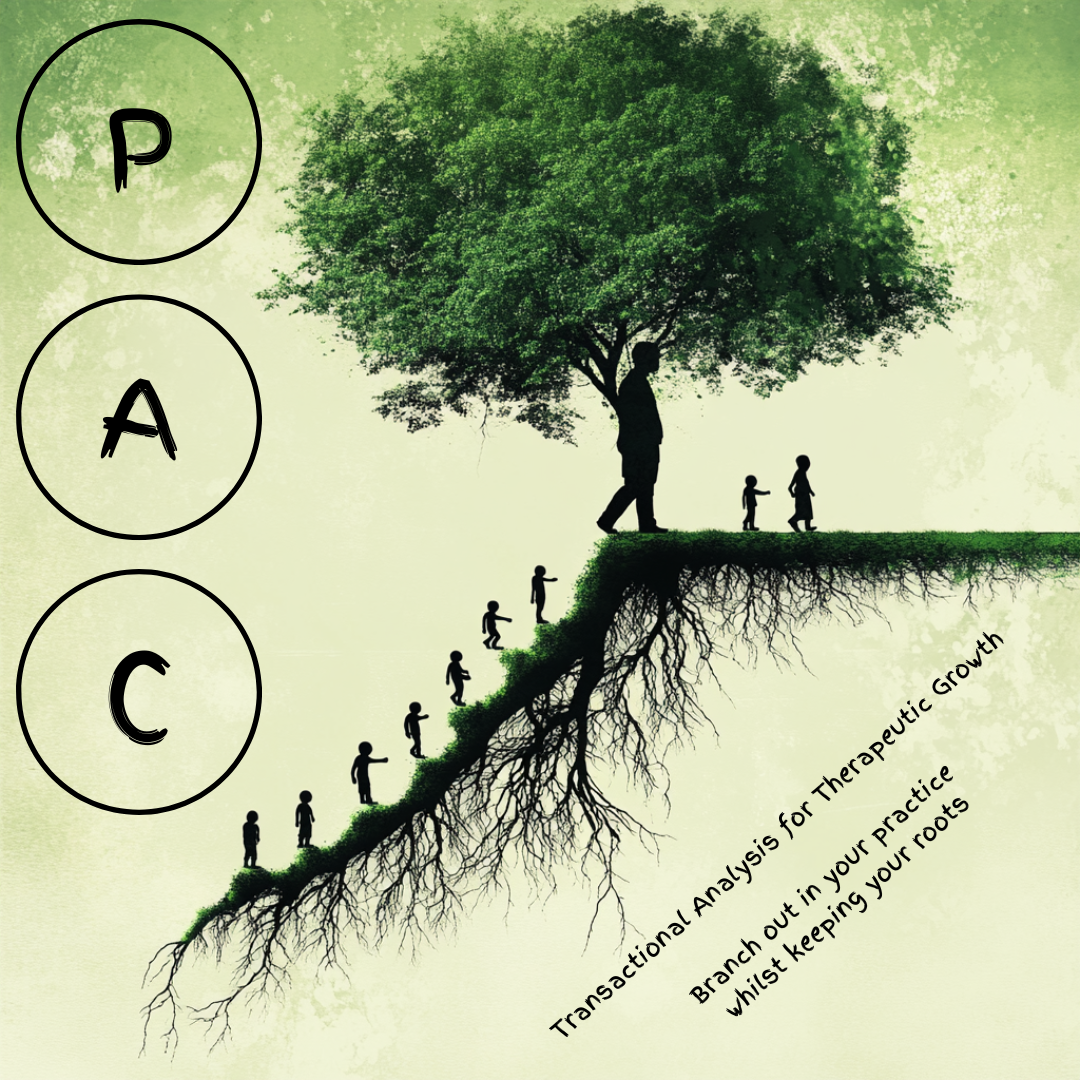Unlock Deeper Client Engagement and Overcome Therapeutic Impasses with Transactional Analysis
Dr Tracy King
Chartered Clinical Psychologist
Unlock Deeper Client Engagement and Overcome Therapeutic Impasses with Transactional Analysis
Dr Tracy King
Chartered Clinical Psychologist

Why Attend This Workshop?
Are you encountering clients who:
Remain entrenched in repetitive, unproductive patterns? -
Struggle with emotional regulation or self-awareness? -
Present challenges in engagement or exhibit resistance to your current therapeutic methods?
Transactional Analysis offers tools to:
Uncover and address the underlying causes of stuckness. -
Enhance therapeutic relationships and communication strategies.
Equip clients with insights and techniques to rewrite their personal narratives.
Understand the best routes to engagement
What You Will Learn
This immersive workshop provides a practical understanding of Transactional Analysis and its application in therapeutic settings.
Key Topics Include:
1. The Ego States Model - Comprehend how the Parent, Adult, and Child Ego States influence client behaviour and communication. Learn techniques to assist clients in accessing their Adult Ego State for improved self-regulation and decision-making.
2. Psychological Games and the Drama Triangle - Identify interaction patterns that contribute to client stagnation. Discover methods to guide clients out of Victim, Rescuer, and Persecutor roles toward empowerment.
3. The Rackett System - Explore how unproductive emotional cycles reinforce life scripts. Acquire tools to disrupt these cycles and promote emotional growth
4. Personality Adaptations - Recognise how various personality adaptations affect engagement and therapeutic progress. Customise your approach using the trap, open, and target doors framework and know why your clients may be resistant to your current approach.
5. TA Driver Theory - Understand the five drivers that influence client behaviour: Be Perfect, Be Strong, Hurry Up, Please Others, and Try Hard. Learn strategies to help clients identify and modify these drivers to foster healthier behaviors.
6. Rewriting Life Scripts - Assist clients in uncovering and revising the unconscious narratives that hinder their progress.
Enhancing Existing Therapeutic Approaches with TA
Integrating TA into various therapeutic modalities can significantly enhance both case formulation and intervention strategies. By incorporating TA concepts, therapists gain deeper insights into clients' internal dynamics and relational patterns, enriching their existing approaches.
Integrating TA into Case Formulation
Ego States Model: TA's division of personality into Parent, Adult, and Child ego states provides a structured lens to understand clients' behaviours, thoughts, and emotions. This model aids in identifying which ego state predominates in specific situations, offering clarity on clients' responses and interactions.
Life Scripts: TA emphasises the unconscious life narratives that individuals develop early in life. Incorporating this concept into case formulation allows therapists to uncover and address deep-seated beliefs and patterns influencing clients' current functioning.
Transactional Patterns: Analysing the transactions between clients and others can reveal repetitive communication patterns and relational dynamics, crucial for formulating cases, especially in relational therapies - relevant for both inside and outside the therapy room.
.How TA Can complement Other Approaches
Cognitive Behavioural Therapy (CBT): TA's Rackett System aligns with CBT's focus on identifying and challenging unhelpful thoughts and behaviours. By understanding clients' Rackett feelings which are recurrent, unproductive emotions stemming from early decisions, therapists can help clients recognise and alter these patterns, promoting healthier cognitive and behavioural responses. By distinguishing between authentic feelings and racket feelings, clients develop greater emotional awareness, facilitating more effective cognitive restructuring.
Psychodynamic Therapy: TA's exploration of life scripts and ego states complements psychodynamic therapy's focus on unconscious processes and early experiences. Integrating TA can provide additional tools to understand clients' internal conflicts and relational patterns. TA provides clear methodS for identifying and understanding repetitive behavioUrs and relational patterns. The transparency inherent in TA's methodology can make the therapeutic process feel less threatening compared to more interpretative approaches, thereby facilitating a safer environment for clients to explore and process their experiences. This combination enhances the therapeutic alliance.
Humanistic Approaches: TA's emphasis on personal growth and self-awareness resonates with humanistic therapies. Incorporating TA can enhance the focus on clients' potential and autonomy. TA's concepts, such as Ego States and LIfe Scripts, offer tangible tools that complement the humanistic focus on personal growth and self-actualisation. This integration allows therapists to facilitate clients' self-awareness and autonomy more effectively, promoting lasting change. Additionally, TA's emphasis on transparent communication and equal client-therapist relationships aligns seamlessly with humanistic values, fostering a collaborative and empowering therapeutic environment.
Acceptance and Commitment Therapy (ACT):
Awareness of TA and integration of approaches can enhance therapeutic outcomes by providing structured frameworks that complement ACT's focus on psychological flexibility and value-driven action. TA's model of ego states: Parent, Adult, and Child offers a structured lens to understand clients' internal dialogues and behaviours. This awareness aligns with ACT's emphasis on mindfulness and present-moment awareness, helping clients recognise and accept different aspects of themselves without judgement. TA's concept of life scripts—unconscious life plans formed in early childhood parallels ACT's focus on cognitive defusion. By identifying and understanding these scripts, clients can distance themselves from unhelpful narratives, reducing their impact on behaviour and promoting more flexible responses. Analysing transactional patterns in TA can reveal how clients' interactions align or conflict with their core values. This insight supports ACT's process of values clarification, guiding clients toward actions that are congruent with their authentic selves.
Schema Therapy:
Integrating TA into Schema Therapy can enhance therapeutic effectiveness by providing structured frameworks that complement and deepen the understanding of clients' maladaptive patterns. TA's model of ego states—Parent, Adult, and Child can map onto Schema Therapy's concept of schema modes, which are moment-to-moment emotional states and coping responses. This allows therapists to gain a nuanced understanding of clients' internal experiences and how these states influence behaviour. TA's concept of life scripts—unconscious life plans formed in early childhood—aligns with Schema Therapy's focus on early maladaptive schemas. TA's emphasis on transactional patterns offers tools to analyse and modify dysfunctional interpersonal behaviours. By integrating TA's structured approaches into Schema Therapy, therapists can enhance their conceptualisation of client presentation and employ targeted interventions to promote healing and growth.
Eye Movement Desensitisation and Reprocessing (EMDR): TA's exploration of life scripts and ego states can inform EMDR's target selection and processing phases, offering insights into the origins of traumatic memories, maladaptive core beliefs and their impact on current functioning.
By weaving TA concepts into case formulation and adding some new intervention tools, therapists can develop more nuanced and effective treatment plans, regardless of their primary therapeutic orientation.
Who Should Attend?
This workshop is designed for professionals in the mental health and therapeutic fields who are interested in enhancing their practice through the integration of Transactional Analysis (TA). It is particularly beneficial for:
Counsellors and Psychotherapists: Seeking to deepen their understanding of client dynamics and improve therapeutic outcomes.
Psychologists: Aiming to incorporate TA concepts into their existing frameworks to enrich client assessments and interventions.
Couples Therapists: Looking to apply TA principles to better understand and address relational patterns within couples.
.
What You `Will Receive
Live Training: A full day of interactive instruction with Dr Tracy King, a clinical psychologist trained in Transactional Analysis.
Practical Tools: Access to worksheets, case studies, and strategies for immediate application in your practice. An ebook of all material covered.
Professional Community: Opportunities to network with like-minded professionals dedicated to transformative therapy.
Certificate of Completion: Recognition of your professional development and commitment to enhancing therapeutic skills.
.
Why Learn with Dr Tracy?
Choosing to learn with Dr Tracy offers a unique opportunity to enhance your therapeutic practice through her extensive expertise and integrative approach:
Comprehensive Expertise: With 24 years in therapeutic fields, Dr. King is a Chartered Clinical Psychologist registered with the Health and Care Professions Council (HCPC) and an Associate Fellow of the British Psychological Society.
Diverse Therapeutic Training: Dr Tracy has completed four years of specialised training in Transactional Analysis (TA) psychotherapy and is fully trained in Eye Movement Desensitisation and Reprocessing (EMDR). She is a Jungian Life Coach, a Yoga & Meditation Teacher, Somatic Practitioner and a Clinical Hypnotherapist.
Client Groups: Her experience spans working with individuals across all age ranges, including adults, children, and couples, within various sectors such as the NHS, prison services, secure units, hospitals, and private practice.
Client-Centered Approach: Dr Tracy emphasises meeting clients where they are at. She utilises an easy-to-understand, transparent, and collaborative framework to facilitate growth and healing through letting go of what does not serve and creating new narratives that rebuild the self and life in a way that fits with personal values.
Learning with Dr Tracy provides access to a wealth of knowledge and practical skills, empowering you to effectively integrate TA concepts into your practice and enhance client outcomes.
Client Compliments
"This course completely changed the way I approach therapy. The insights into ego states and life scripts gave me practical tools I could use immediately with my clients. One of my long-term clients, who had been feeling 'stuck' for months, made a breakthrough after I introduced some of the concepts from the training. It’s honestly one of the most impactful courses I’ve attended in a long time!"
Dr S Mitchell, Clinical Psychologist
"I work primarily with couples, and the Drama Triangle alone was worth the price of the course. It’s been incredible to help my clients recognize how they fall into these roles and guide them toward healthier interactions. The training was clear, interactive, and packed with practical techniques I now use daily. Highly recommend it for any therapist!"
J. Price, Couples Counsellor
"I’ve been to a lot of workshops, but this one stood out because of how seamlessly Transactional Analysis integrates with other approaches like CBT and Schema Therapy and this was not someone telling me to forget everything I knew before. I also loved how it emphasised helping clients feel empowered not pathologised. The combination of theory and hands-on application made it so valuable—I left feeling confident and inspired to use what I learned."
S Marshall, Psychotherapist
Next Course Date: February 6th 2026 10- 5pm GMT
Price £250. Earlybird Rate of £225 if booked by October 1st 2025 Instalments available see below.
Click the image below to hear me talking about TA as a guest on the Mastering Therapy Podcast

"Embracing new therapeutic approaches empowers us to meet our clients' evolving needs, ensuring we provide the most compassionate and effective care possible"
Dr Tracy

Click the image below to find out more about my book available via all major book retailers
"As therapists, our commitment to continuous learning and expanding our therapeutic toolkit is essential to effectively support our clients' unique journeys toward healing and growth."
Dr Tracy